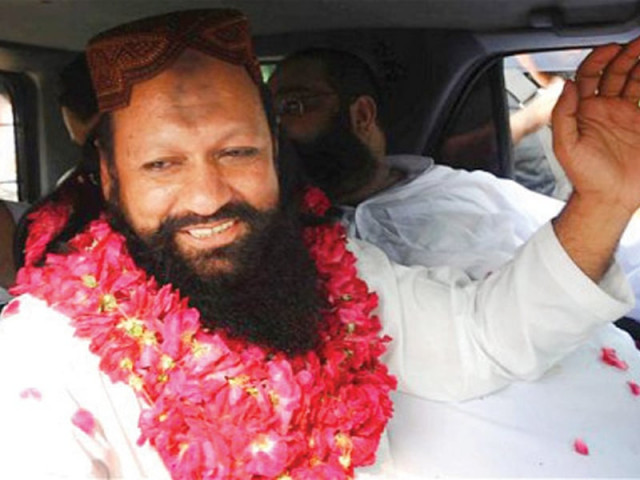Malik Ishaq freed, only on paper
LeJ leader nominated for Khanpur procession blast right after review board released him from detention.

Malik Ishaq will not be freed anytime soon.
The day a review board denied Punjab government an extension to the detention of the Lashkar-e-Jhangvi (LeJ) founder, a first information report (FIR) was lodged against him in the Khanpur blast case.
The FIR names six people responsible for the attack on a Chehlum procession in Khanpur on January 14, which killed at least 18 and injured several others.
According to SHO Jam Manzoor Ahmed, the FIR, lodged on Friday under the Anti-Terrorism Act, names Ishaq, his son Malik Usman, and his associates Ghulam Quraishi, Shafiq Dahir, Malik Yaqub and Ghulam Rasool Shah.
All those named in the FIR are from LeJ, the SHO said, adding that a joint investigation team comprising officials from police and counter-terrorism department will investigate the case.
Sources in the intelligence agencies said that this is the second instance where Ishaq and his associate Rasool planned an attack while they were imprisoned, the first being the attack on the Sri Lankan cricket team in Lahore.
Extension denied
A provincial review board, comprising Lahore High Court judges, turned down Punjab government’s request to extend Ishaq’s detention. The board said the police had failed to provide concrete evidence of Ishaq’s involvement in terrorist activities.
The review board, headed by Justice Nasir Saeed Sheikh, heard the detained leader and representatives of the government behind closed doors.
District police officer (DPO) Rahimyar Khan had requested the board to extend Ishaq’s detention, ending on January 25, for another 30 days, saying that his release would be a threat to peace, and the public at large.
Ishaq’s detention had earlier been extended by a review board on December 16, after DPOs of Rahimyar Khan and Bahawalnagar had said his release could result in a ‘law and order situation’.
A legal adviser of home department argued that Ishaq delivered provocative speeches and spread sectarian hatred. The officials also held Ishaq responsible for the attack on a Shia procession in Khanpur, saying it happened due to his inflammatory speeches.
The review board asked the government if they had filed any cases against Ishaq if he was a threat to peace or delivered provocative speeches, to which they had nothing to show to the court.
The legal adviser, however, submitted that Ishaq’s name was placed in the fourth schedule of the anti-terrorism act, and was required to inform authorities about his movement.
Ishaq travelled to remote areas without informing the police, and he was therefore violating the law, the government argued. Ishaq, meanwhile, insisted he was not involved in any illegal or terrorist activity and had spent 14 years in jails facing cases against him. (With additional input by Kashif Zafar in Bahawalpur)
Published in The Express Tribune, January 21st, 2012.



















COMMENTS
Comments are moderated and generally will be posted if they are on-topic and not abusive.
For more information, please see our Comments FAQ